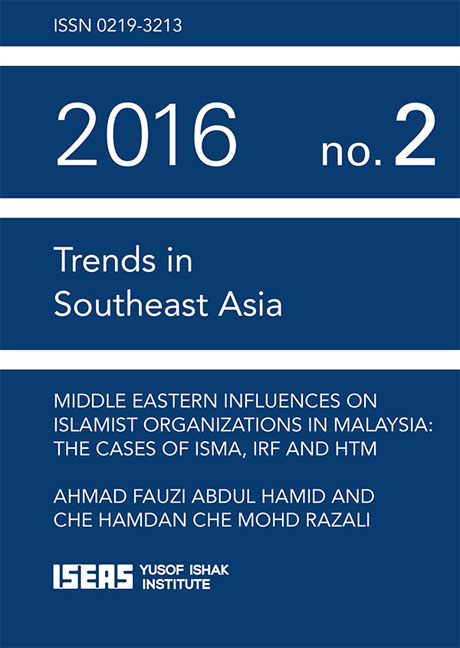Middle Eastern Influences on Islamist Organizations in Malaysia: The Cases of ISMA, IRF and HTM
Published online by Cambridge University Press: 09 March 2019
Summary
Introduction
Islamist activism in the politics of the Malayan peninsula began during the early post-Second World War years, and was dominated until the early 1970s by the Pan-Malayan Islamic Party (PMIP). PMIP was the chosen outfit for political Islamists previously associated with such fiercely anti-colonial movements as the Malay Nationalist Party (MNP, or Pertubuhan Kebangsaan Melayu Malaya), Party of Muslims (Hizbul Muslimin [HM]) and Defenders of the Motherland (Pembela Tanahair [PETA]) (Ahmad Fauzi 2007a, pp. 387–91; Liow 2009, p. 21). By the time the National Front (Barisan Nasional [BN]) was founded in 1974 to succeed the Alliance (Perikatan) coalition, PMIP had morphed into the Islamic Party of Malaysia (Parti Islam SeMalaysia [PAS]), which is still a major actor in Malaysia's Islamist scene today.
Following the May 1969 racial troubles that engulfed the capital city of Kuala Lumpur, the Malaysian state embarked on a series of reconstruction policies, chief of which was the New Economic Policy (NEP, 1971–90). The affirmative action policies of the NEP laid the first seeds of a new wave of Islamic revival in Malaysia, as state-provided educational opportunities exposed new cohorts of Malay-Muslim youths to political socialization in university campuses both at home and abroad. A significant portion of these new experiences, taking place far away from their traditional village ambience, took on religious colouring as they mixed with international Muslim students and academics through whom they were introduced to the writings of Islamic resurgence ideologues such as Hassan al-Banna (1906–49), Sayyid Qutb (1906–66), Abul A'la Maududi (1903–79), Fathi Yakan (1933–2009), Sa'id Hawwa (1935–89), Said Ramadan (1926–95), Abdul Karim Zaidan (1917–2014), Said Ramadan al-Bouti (1929–2013) and Yusuf al-Qaradawi (1926–). Except for Maududi who was Indo-Pakistani, all the other major influences on post-1969 Islamic revivalist thought in Malaysia were Middle Eastern thinkers, whose original works were written in Arabic. This meant that their books and treatises reached their Malaysian audience mainly through translations, either into Malay or English. Apart from the Middle Eastern figures, two other scholars whose writings made a discursive impact on Malaysia's Islamist scene, although to a lesser extent than the others listed earlier, were the Indian Abul Hasan Ali Nadwi (1914–99), and Said Nursi (1877–1960), a Turk of Kurdish descent (Kamal Hassan 2003, pp. 430–40; Lemiere 2009, pp. 66–67, 71, 78, 83; Zulkifli Hassan 2013).
- Type
- Chapter
- Information
- Middle Eastern Influences on Islamist Organizations in MalaysiaThe Cases of ISMA, IRF and HTM, pp. 1 - 28Publisher: ISEAS–Yusof Ishak InstitutePrint publication year: 2016

